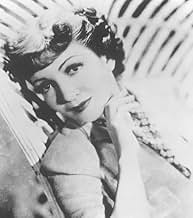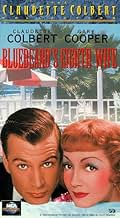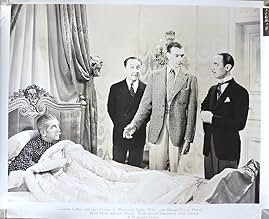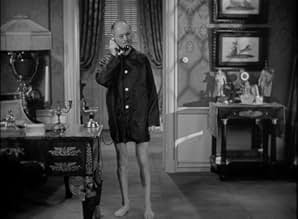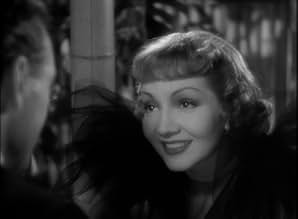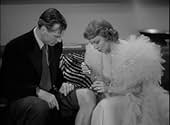Après avoir découvert que son fiancé milliardaire a déjà été marié et divorcé plusieurs fois, la fille d'un marquis sans le sou décide de le mater.Après avoir découvert que son fiancé milliardaire a déjà été marié et divorcé plusieurs fois, la fille d'un marquis sans le sou décide de le mater.Après avoir découvert que son fiancé milliardaire a déjà été marié et divorcé plusieurs fois, la fille d'un marquis sans le sou décide de le mater.
- Prix
- 2 victoires au total
Mariska Aldrich
- Nurse at Door
- (uncredited)
Leon Ames
- Ex-Chauffeur
- (uncredited)
Lenore Aubert
- Party Guest
- (uncredited)
Eugene Borden
- Waiter on the Stairs
- (uncredited)
Barlowe Borland
- Uncle Fernandel
- (uncredited)
Avis en vedette
It starts in the French Riviera at a dressing department store where an elegant man wants to buy pyjama tops and a woman the bottoms . He is the US multi-millionaire Michael Brandon (Gary Cooper, though miscast , at times ) who tries to marry his eight wife , called Nicole (Claudette Colbert is fine as the beautiful girl who aims to be his eighth) . After learning her multi-millionaire fiancé has already been married seven times , Nicole , daughter of a bankrupted French Marquis (Edward Everett Horton) attempts to tame the egoistic man and he then ends at an asylum . He married in haste and repeated in pleasure!
Problematic comedy and sporadically fun , set in the French Riviera about a spoiled millionaire who attempts to marry the daughter of a penniless marquis , she then decides to control him , as she doesn't want to be only a number in the row of his ex-wives and starts her own strategy to "tame" him . Good for a few laughs , based on the play by Alfred Savoir and American version by Charlton Andrews with a diverting script by prestigious Charles Brackett and Billy Wilder , though providing a wrong sort of discomfort to the closing scenes at a lunatic sanatorium . Adding some scenes justifying Ernst Lubitsch's reputation for his famous ¨Touch¨ , along with adequate as well as evocative musical score by Frederick Hollander . This Lubitsch romp contains a very good main and support cast . Gary Cooper is nice as the millionaire who who can handle money but not wives , as he has a comeuppance coming up from the eighth , though Coop seems out of place as a playboy . Claudette Colbert is perfect as the woman who aims to be his eighth and she then tries to tame him. There's astringent and typecast secondary cast from sympathetic Edward Everett Horton as the broken Marquis De Loiselle , delightful David Niven as Albert De Regnier , Elizabeth Patterson as Aunt Hedwige , Herman Bing as Monsieur Pepinard , Warren Hymer as Kid Mulligan and Franklin Pangborn as snooty Assistant Hotel Manager
The motion picture well photographed by Leo Tover was competently made by master filmmaker Ernst Lubitsch ,though softening the script's acidity, and he had previously directed Gary Cooper in Design for life . Lubitsch was a maestro director of naughty but entertaining comedies who had lots of successes . Lubitsch's breakthrough film came in 1918 with "The Eyes of the Mummy", a tragedy starring future Hollywood star Pola Negri. Also that year he made Carmen (1918), again with Negri, a film that was commercially successful on the international level. His work already showed his genius for catching the eye as well as the ear in not only comedy but historical drama. The year 1919 found Lubitsch directing seven films, the two standouts being his lavish Madame DuBarry (1919) with two of his favorite actors--Negri (yet again) and Emil Jannings. His other standout was the witty parody of the American upper crust, "The Oyster Princess" 1919 . This film was a perfect example of what became known as the Lubitsch styl e, or the "Lubitsch Touch", as it became known--sophisticated humor combined with inspired staging that economically presented a visual synopsis of storyline, scenes and characters. Lubitsch directed a lot of comedies and vintage movies , such as : ¨Heaven can wait¨, ¨That uncertain feeling¨, ¨Ninotchka¨, ¨Bluebeard's eight wife¨, ¨Angel¨, ¨The merry widow¨, ¨The Student Prince¨, ¨So this is Paris¨, ¨Lady Windermere's fan¨, ¨The marriage circle¨, ¨One Arabian night¨, ¨Passion¨, ¨Gypsy blood¨, among others . Rating : 7/10 . Better than average .
Problematic comedy and sporadically fun , set in the French Riviera about a spoiled millionaire who attempts to marry the daughter of a penniless marquis , she then decides to control him , as she doesn't want to be only a number in the row of his ex-wives and starts her own strategy to "tame" him . Good for a few laughs , based on the play by Alfred Savoir and American version by Charlton Andrews with a diverting script by prestigious Charles Brackett and Billy Wilder , though providing a wrong sort of discomfort to the closing scenes at a lunatic sanatorium . Adding some scenes justifying Ernst Lubitsch's reputation for his famous ¨Touch¨ , along with adequate as well as evocative musical score by Frederick Hollander . This Lubitsch romp contains a very good main and support cast . Gary Cooper is nice as the millionaire who who can handle money but not wives , as he has a comeuppance coming up from the eighth , though Coop seems out of place as a playboy . Claudette Colbert is perfect as the woman who aims to be his eighth and she then tries to tame him. There's astringent and typecast secondary cast from sympathetic Edward Everett Horton as the broken Marquis De Loiselle , delightful David Niven as Albert De Regnier , Elizabeth Patterson as Aunt Hedwige , Herman Bing as Monsieur Pepinard , Warren Hymer as Kid Mulligan and Franklin Pangborn as snooty Assistant Hotel Manager
The motion picture well photographed by Leo Tover was competently made by master filmmaker Ernst Lubitsch ,though softening the script's acidity, and he had previously directed Gary Cooper in Design for life . Lubitsch was a maestro director of naughty but entertaining comedies who had lots of successes . Lubitsch's breakthrough film came in 1918 with "The Eyes of the Mummy", a tragedy starring future Hollywood star Pola Negri. Also that year he made Carmen (1918), again with Negri, a film that was commercially successful on the international level. His work already showed his genius for catching the eye as well as the ear in not only comedy but historical drama. The year 1919 found Lubitsch directing seven films, the two standouts being his lavish Madame DuBarry (1919) with two of his favorite actors--Negri (yet again) and Emil Jannings. His other standout was the witty parody of the American upper crust, "The Oyster Princess" 1919 . This film was a perfect example of what became known as the Lubitsch styl e, or the "Lubitsch Touch", as it became known--sophisticated humor combined with inspired staging that economically presented a visual synopsis of storyline, scenes and characters. Lubitsch directed a lot of comedies and vintage movies , such as : ¨Heaven can wait¨, ¨That uncertain feeling¨, ¨Ninotchka¨, ¨Bluebeard's eight wife¨, ¨Angel¨, ¨The merry widow¨, ¨The Student Prince¨, ¨So this is Paris¨, ¨Lady Windermere's fan¨, ¨The marriage circle¨, ¨One Arabian night¨, ¨Passion¨, ¨Gypsy blood¨, among others . Rating : 7/10 . Better than average .
When my colleague suggested watching this movie, she showed me the Shakespeare-reading scene. As I found it really amusing, I later watched the whole piece. And I didn't regret the time I spent! To say honestly, I'm not the old movie addict who knows all the history of American and European film industry back to black-and-white silent pictures and being woken up at night can list all the prominent actors and directors. I'm not into movies at all, which is the reason that my watching list is highly haphazard with British series followed up by French melodramas and historical documentaries. Bluebeard's Eighth Wife is a really nice piece featuring good-looking actors, jokes, funny without the slightest trace of vulgarity. The plot is a turned inside out ''Taming of the Shrew'', and no wonder it appears as a book the main hero reads, as I mentioned at the beginning of my review. However, it is common knowledge that not the plot itself, but its presentation matters, and in this case it does not undermine expectations. The naivety of the old times has a special charm, especially the good old happy end, so enjoy!
'Absolutely delightful' sounds a bit twee doesn't it? The mid-thirties were awash with so-called 'sophisticated comedies' all pretty bland and predictable. This however has something special about it. It's not quite a laugh out loud comedy but it's genuinely charming and guaranteed to leave you a happier person.
What makes this a class above most offerings from 1938 is that you can't help loving the characters. Clearly it's easy to fall in love with Claudette Colbert but Gary Cooper's millionaire is surprisingly endearing too. He was excellent in the brilliant comedy BALL OF FIRE with Barbara Stanwyck but because you associate Gary Cooper with stoic, serious roles, when he's in a comedy, a genuinely funny comedy and he is genuinely funny himself, it really makes an impression. He's still every inch, the man's man but also oblivious to the ways of the fairer sex. That he tries to learn about how to treat troublesome women by reading The Taming of the Shrew is a classic piece of comedy.
Lubitsch was the undisputed master at making a simple battle of the sexes movies witty, loading it with sexual frustration and innuendo whilst still making it utterly charming.....but this was no simple battle of the sexes movie - this was written by Charles Bracket and Billy Wilder so Lubitsch didn't have to try too hard. Like any good comedy, the humour comes from your belief in the realness of the characters and this is such a well crafted 'rom com' that you're completely drawn into this silly but lovely picture. When it ends, you are smiling and you feel like applauding!
And of course, Claudette Colbert looks like a goddess!
What makes this a class above most offerings from 1938 is that you can't help loving the characters. Clearly it's easy to fall in love with Claudette Colbert but Gary Cooper's millionaire is surprisingly endearing too. He was excellent in the brilliant comedy BALL OF FIRE with Barbara Stanwyck but because you associate Gary Cooper with stoic, serious roles, when he's in a comedy, a genuinely funny comedy and he is genuinely funny himself, it really makes an impression. He's still every inch, the man's man but also oblivious to the ways of the fairer sex. That he tries to learn about how to treat troublesome women by reading The Taming of the Shrew is a classic piece of comedy.
Lubitsch was the undisputed master at making a simple battle of the sexes movies witty, loading it with sexual frustration and innuendo whilst still making it utterly charming.....but this was no simple battle of the sexes movie - this was written by Charles Bracket and Billy Wilder so Lubitsch didn't have to try too hard. Like any good comedy, the humour comes from your belief in the realness of the characters and this is such a well crafted 'rom com' that you're completely drawn into this silly but lovely picture. When it ends, you are smiling and you feel like applauding!
And of course, Claudette Colbert looks like a goddess!
There is something about seeing a movie in a good, old-fashioned movie house that adds enormous appeal to every picture. I, fortunately enough, was able to see at Film Forum in New York City a pair of Ernst Lubitsch comedies during their three week tribute to the legendary director. The double feature I attended was a screening of Lubitsch's 1938 comedy Bluebeard's Eighth Wife and the pre-Code classic Design for Living, neither of which I had seen before. Everything I read of Design for Living praised the film, but I could not find a good review anywhere for Bluebeard's Eighth Wife. Leonard Maltin disliked it.VideoHound, too, gave the comedy a low rating.its IMDB score was not complimentary.and Pauline Kael (not a great surprise) blasted the film in her scathing review. So, when I went into the city that day I was expecting to enjoy Bluebeard's Eighth Wife only slightly and love Design for Living completely. Bluebeard's Eighth Wife (which was showing first) began, as the eccentrics who populate the cinema took their seats and the thirties music subsided. `Adolph Zukor presents Claudette Colbert and Gary Cooper in Ernst Lubitsch's Bluebeard's Eighth Wife,' the title card read. Then the picture opened with a hilarious scene: Cooper wants to buy a pair of pajama tops, but he doesn't want any part of the bottoms! He gets into a squabble with the clerk, who seeks the help of his higher bosses, and their seems to be no end to the argument. Enter Claudette Colbert, one of thirties cinema's most beautiful, charming, and talented personalities. `I'll take the bottom,' she kindly intercedes. And there you have perhaps screwball comedies finest `meet cute' ever. The film kept my interest wonderfully.I found myself laughing almost constantly. When Colbert discovers, just before a family portrait is taken, that her groom-to-be has been married seven times, the entire theatre broke into histerics. When she bargains for money immediately after she gets over her shock, the laughs (which still haven't ceased) intensify. And Edward Everett Horton milked some hilarious reactions out of the script as well. When Cooper takes inspiration from Shakespeare's The Taming of the Shrew in disciplining his wife by slapping her in the face, I could not control my laughter when she slapped him back. And the drunk scene with the scallions is one of Claudette Colbert's funniest comic scenes. The greatest comic moment of the film came when Colbert highers a boxer to `teach her husband a lesson.' In pure screwball fashion, he knocks out the wrong man, instead putting her friend David Niven into a cold sleep. He awakes as Cooper is arriving. In order to cover up the situation, Colbert herself, in a moment of strong sexiness, puts her fist up to Niven, asks: `Where did that man hit you? Here? Right here? Right here?' and then BAM! knocks him out again! The film was wonderful, from beginning to end it was a perfect delight. I loved Design for Living, too, though I dare say I think for sheer laughs and entertainment Bluebeard's Eighth Wife was the better and more enjoyable film. There is some charm of seeing a vintage film on the large screen. And in the presence of others laughing, one feels more comfortable doing so himself. That is, perhaps, why I felt the way I did about Bluebeard's Eighth Wife.
An Ernst Lubitsch comedy, co-scripted by Billy Wilder and Charles Brackett, which has always been generally dismissed by critics and fans alike. Perhaps with the film's reputation as a lesser effort those who sit down to view it will be pleasantly surprised to find it an agreeable affair, anyway.
Gary Cooper plays a seven times married American businessman millionaire who finds that with wife no. 8 (Claudette Colbert) he may have met his match. She has made him agree to a pre nuptial agreement of paying her $100,000 should there be a divorce and then makes him spend much of the marriage unhappy and wishing he hadn't signed that agreement.
While the film is never as funny or clever as the best of Lubitsch, it still has its moments. The film is remembered primarily for the scene in which Colbert and Cooper "meet cute" as they agree to split a pair of pajamas in a department store.
But there are other moments, too, such as the scene in which Cooper, inspired by having just read Taming of the Shrew, bursts out of his room, walks with great macho determination and accompanying soundtrack drum roll down a hallway, enters a room where Colbert stands and slaps her across the face. She responds by slapping him back and Cooper, perplexed by this unexpected turn of events, leaves the room, walks back through that same hallway to his room again and picks up the book to try to figure out what he did wrong.
Like all Lubitsch productions this film has a graceful air of sophistication, with a physical elegance in its sets and photography. Colbert is an old hand at frothy material like this while Cooper, cast against type, plays his role with obvious enthusiasm. He's a far cry from the Cooper we're used to seeing on screen in the scene in which he plays a piano while singing "Looky, looky, looky, Here comes Cookie" to Claudette. The supporting cast is first rate, all of them deft performers: a young David Niven, and old pro character actors Edward Everett Horton and Herman Bing.
English mangling, beer barrel shaped Herman Bing is the unlikeliest of detectives, hired by Cooper to follow his wife to see if she has any lovers. "Don't forget," he tells the millionaire, "we are a first class firm. You will find that out when you get our bill." Recommended as middling production code era Paramount fare.
Gary Cooper plays a seven times married American businessman millionaire who finds that with wife no. 8 (Claudette Colbert) he may have met his match. She has made him agree to a pre nuptial agreement of paying her $100,000 should there be a divorce and then makes him spend much of the marriage unhappy and wishing he hadn't signed that agreement.
While the film is never as funny or clever as the best of Lubitsch, it still has its moments. The film is remembered primarily for the scene in which Colbert and Cooper "meet cute" as they agree to split a pair of pajamas in a department store.
But there are other moments, too, such as the scene in which Cooper, inspired by having just read Taming of the Shrew, bursts out of his room, walks with great macho determination and accompanying soundtrack drum roll down a hallway, enters a room where Colbert stands and slaps her across the face. She responds by slapping him back and Cooper, perplexed by this unexpected turn of events, leaves the room, walks back through that same hallway to his room again and picks up the book to try to figure out what he did wrong.
Like all Lubitsch productions this film has a graceful air of sophistication, with a physical elegance in its sets and photography. Colbert is an old hand at frothy material like this while Cooper, cast against type, plays his role with obvious enthusiasm. He's a far cry from the Cooper we're used to seeing on screen in the scene in which he plays a piano while singing "Looky, looky, looky, Here comes Cookie" to Claudette. The supporting cast is first rate, all of them deft performers: a young David Niven, and old pro character actors Edward Everett Horton and Herman Bing.
English mangling, beer barrel shaped Herman Bing is the unlikeliest of detectives, hired by Cooper to follow his wife to see if she has any lovers. "Don't forget," he tells the millionaire, "we are a first class firm. You will find that out when you get our bill." Recommended as middling production code era Paramount fare.
Le saviez-vous
- AnecdotesThis was the first collaboration of director Ernst Lubitsch with writers Charles Brackett and Billy Wilder. At their first production meeting, Lubitsch posed this question: "How do the boy and girl get together?". Wilder promptly suggested that the opening scene should be in the men's shop of a department store. "The boy is trying to buy a pajama," he extemporized, "but he sleeps only in the tops. He is thrifty so he insists on buying ONLY the tops. The clerk says he must buy the pants, too. It looks like a catastrophe. Then the girl comes into the shop and buys the pants because she sleeps only in the pants." Lubitsch and Brackett were enchanted with this idea. Months later, they discovered that Wilder himself was a pajama tops-only sleeper and had been contemplating this idea for months, waiting for a chance to use it in a comedy.
- GaffesWhen Nicole shuts the door to her part of the apartment to keep Michael out, the door can be heard being locked. However, there is no keyhole or lock visible on either side of the door.
- Citations
Nicole de Loiselle: [sarcastically] Mr. Brandon, you're terrific. You're gigantic! You're - you're breathtaking. I wish someone would tell you what I really think of you.
- ConnexionsFeatured in The Great Canadian Supercut (2017)
- Bandes originalesHere Comes Cookie
(1935) (uncredited)
Music and Lyrics by Mack Gordon
Performed by Gary Cooper (vocal and piano)
Meilleurs choix
Connectez-vous pour évaluer et surveiller les recommandations personnalisées
- How long is Bluebeard's Eighth Wife?Propulsé par Alexa
Détails
- Date de sortie
- Pays d’origine
- Langues
- Aussi connu sous le nom de
- Osma žena Plavobradog
- Lieux de tournage
- société de production
- Consultez plus de crédits d'entreprise sur IMDbPro
Box-office
- Budget
- 1 300 000 $ US (estimation)
- Durée1 heure 25 minutes
- Couleur
- Rapport de forme
- 1.37 : 1
Contribuer à cette page
Suggérer une modification ou ajouter du contenu manquant


